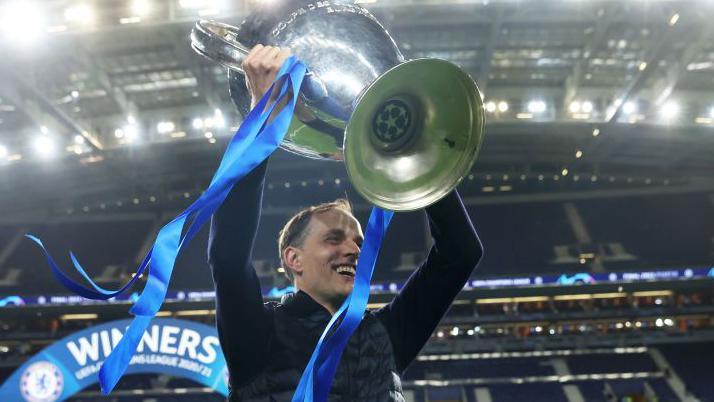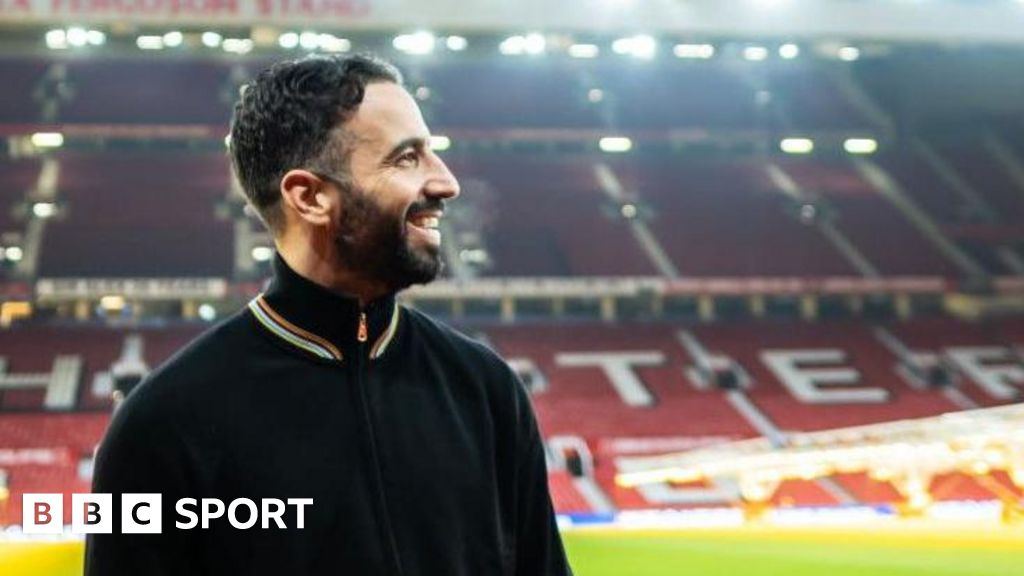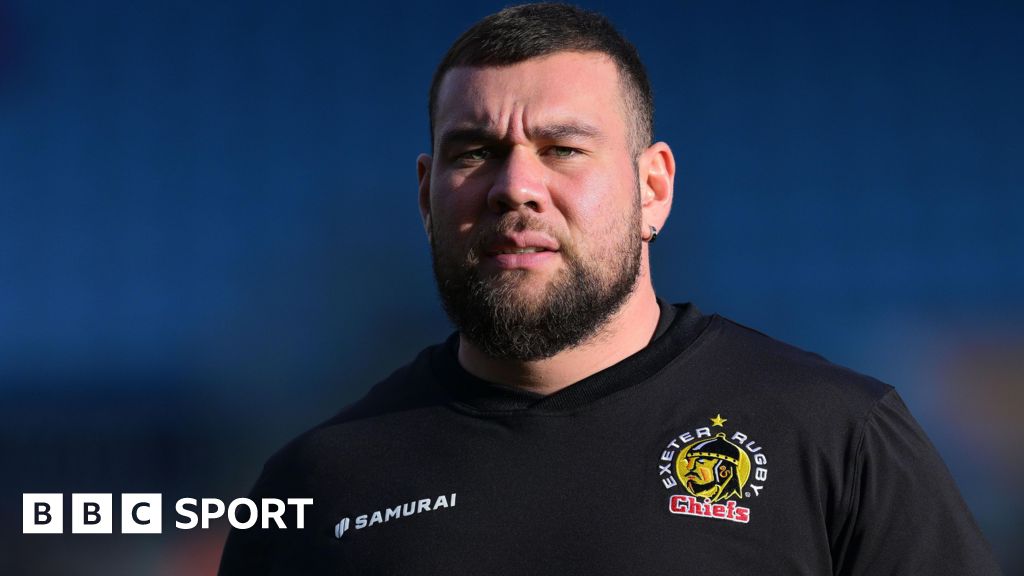ARTICLE AD BOX
 Image source, Getty Images
Image source, Getty Images
Thomas Tuchel's track record of success included winning the Champions League with Chelsea in 2021
The Football Association’s decision to appoint Thomas Tuchel as the new England coach will be regarded by many as a betrayal of the much-touted pathway from the national team's headquarters at St George’s Park to the top and an insult to home-grown managerial talent.
German Tuchel will succeed Gareth Southgate, who held the post for eight years after coaching England’s under-21 team for a three-year spell, taking over from interim Lee Carsley, a coach who travelled the same journey as Southgate through the FA’s development system.
Tuchel’s arrival is a radical and significant diversion from the route laid out by the FA's so-called “DNA” mantra delivered a decade ago by Dan Ashworth, the organisation’s then director of elite development, designed to establish a philosophy running through every England team.
England’s second successive European Championship final loss in the summer extended a barren sequence stretching back to the 1966 World Cup for the men’s team, but Tuchel taking over may offend the nationalistic purists who will view him as the sacrifice of principle for a quick fix in time for the 2026 World Cup.
Should England’s coach be English – or best for the job?
This will be one of the biggest questions swirling around Tuchel’s appointment, but no-one can argue the FA have not signed up one of the game’s elite figures with a proven track record of success.
England's national football team is not an experiment or vanity project. It exists to be successful, to win trophies, This is something the country’s men have not achieved for 58 years, so something had to change after the recent near misses under Southgate.
Nationality was of no concern when England women’s team won Euro 2020 under Dutch coach Sarina Wiegman. It was cause for national celebration.
There is an "our best against your best" argument that carries some validity when framed within international football, but the most valuable currency remains tangible success and only those with very long memories recall 1966.
The FA wants to change that narrative and if means thinking outside England so be it.
A move for Tuchel will be viewed by sceptics through the prism of the Sven-Goran Eriksson and Fabio Capello eras – especially the latter, with the Italian barely even bothering to learn the language – both departures from the English path that did not bring success despite the talent at their disposal.
There may even be specific criticism about appointing a coach from Germany, traditionally regarded as one of England’s biggest football rivals.
And the FA will also have to answer questions about what message this sends to English coaches, with Tuchel being preferred to the available former Brighton and Chelsea manager Graham Potter and Eddie Howe, who is committed to Newcastle United but boasts all the credentials to have been seriously considered.
The FA will say, with some justification, they have simply appointed the best available man for the job with Manchester City manager Pep Guardiola an unattainable pipe dream and former Liverpool manager Jurgen Klopp out of reach.
Did the FA simply want an English coach – or did they want the coach who will make the England team winners?
The answer to that question is Tuchel.
Image source, Getty Images
Image caption,Thomas Tuchel was a driving force in bringing England captain Harry Kane to Bayern Munich during his time in charge at the club
For this the FA deserves commendation, but chief executive Mark Bullingham and technical director John McDermott, who have led the recruitment process, will be well aware there will scrutiny and criticism running alongside praise for pulling off the Tuchel coup.
And surely St George’s Park and all the coaches and development teams nurtured there can only benefit from having someone of Tuchel’s stature and success rate in the building? He will not live on an island. The FA will hope he can make his own indelible mark on future coaching generations.
Tuchel is also regarded as an Anglophile, his love of English players and the English game sharpened in a 20-month spell at Chelsea, during which time he won the Champions League in 2021, the Uefa Super Cup and the Fifa Club World Cup before being sacked in September 2022. He still recalls his time at Stamford Bridge fondly despite the sour ending.
He had already taken Paris St-Germain to the Champions League Final, where the lost to Bayern Munich, the year before his triumph with Chelsea and since then has won the Bundesliga with Bayern and was only two minutes away from taking them to the final last season before they were beaten by Real Madrid.
Tuchel has never hidden his admiration for the English football mentality, driving captain Harry Kane’s transfer to Bayern from Tottenham then bringing in his former Spurs team-mate Eric Dier. He was also close to signing another player now under his guidance with England, Manchester City’s Kyle Walker.
Unlike Eriksson and Capello, his foreign predecessors as England coach, he has first-hand, recent experiences of English football and the players he will be inheriting.
The FA’s move will be controversial and contentious – but few can argue they have appointed one of the great modern coaches, an operator of the highest calibre.
England go from diplomat to firebrand
Southgate was the consumate ambassador and diplomat as England manager, displaying a rounded world view, a willingness to speak openly with a wider hinterland stretching far beyond football. It was a quality that served him well when waves spread beyond the pitch.
Tuchel, in contrast, is a fiery personality known for challenging authority, high maintenance and occasionally outspoken. He does not possess the calm touchline demeanour England grew accustomed to with Southgate. They will now have an explosive presence in the technical area.
He is also well-known for not sparing his players, with old footage of Tuchel in a fierce rage, delivering an incendiary training ground dressing down to Shawn Parker when he was at Mainz surfacing again recently.
Borussia Dortmund chief executive Hans-Joachim Watzke described Tuchel as “a difficult person but a fantastic coach”, while he had a notoriously fractious relationship with PSG sporting director Leonardo. He suggested Tuchel lacked respect for those above him, with the pair disagreeing over recruitment strategy in the so-called “Bling Bling” era of superstars in Paris.
Tuchel, tiring of dealing with events away from the pitch at PSG, asked shortly before his sacking in December 2020: “Am I still a manager or am I politician in sport, a minister for sports?”
The other side of his personality was witnessed by those of who saw Tuchel at Chelsea where he could be charming, extremely humorous and incredibly astute, as well as acting with great dignity and tact when forced into being the front man for a club in meltdown when owner Roman Abramovich’s assets were frozen in the wake of Russia’s invasion of Ukraine.
Tuchel was a figure of calm and reason, even insisting he would drive a team bus to Lille himself for a Champions League tie in March 2022 if sanctions meant they were unable to fly.
The relationship with new Chelsea owner Toddy Boehly was uneasy from the start as the club employed a scattergun transfer policy. Tuchel lasted exactly 100 days under the regime before he was sacked.
Tuchel remained a highly popular figure with Chelsea’s fans, who were sorry to see the coach who brought the Champions League back to London dismissed.
In his new role, Tuchel will be able to set aside backroom politicking and focus on an area where he is outstanding and proven.
And this is what the FA will want with the bold move to go outside their long-standing system in the search for the glory that has eluded them since 1966.
If Tuchel delivers, the FA can feel it makes all the angst and outside noise over the appointment worthwhile.

 1 month ago
11
1 month ago
11








 English (US)
English (US)